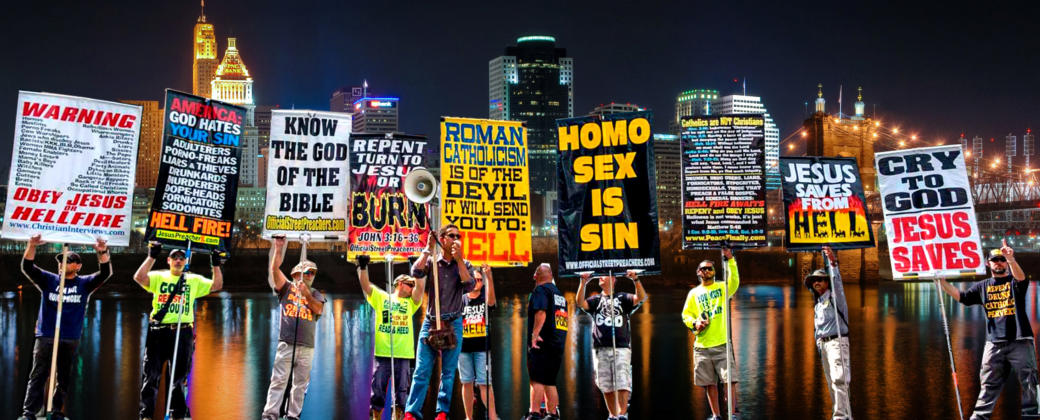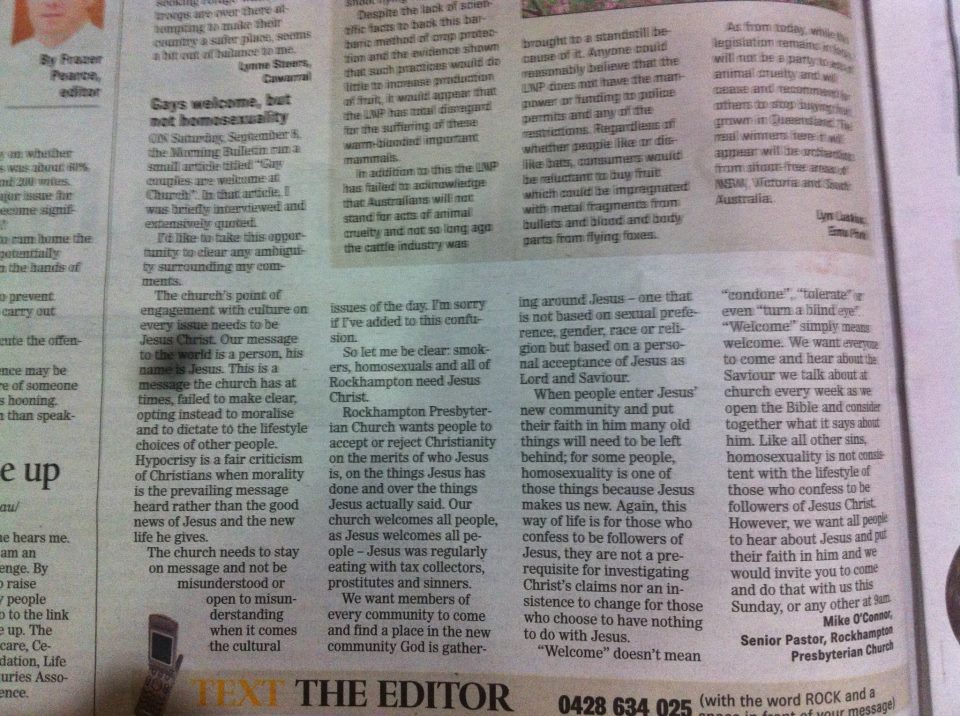Is it possible that Christians spend far too much time trying to decide whether a particular action or thought is sinful, and not enough time thinking about what sin really is, or what goodness really looks like as an alternative? We’re worried about our hands and eyes, where perhaps we should be more worried about our hearts. Is it possible that we’re obsessively worried about sin, when perhaps we should be excited and thankful that despite our inability not to sin, God forgives us and changes our hearts through Jesus, and invites us to follow his example. Is it possible this worry comes through in the way we present the ‘good’ news of the Gospel?

Sin and defining ‘good’
In the beginning, God looked at the stuff he made in this universe and declared it ‘good’ — but what does ‘good’ mean?
I’ve always injected a bunch of my own understandings of the word ‘good’ into the first chapter of the Bible, which typically revolve around my fairly modern assumption that goodness is a sort of material quality, perhaps even an aesthetic quality. God made a good world like IKEA does not make a good table. God made a good world like an artisan specialty coffee roaster makes a good flat white. It’s good because of what it is, and how I experience it.
But what if ‘good’ means something other than that the universe was, as declared by God, materially excellent? John Walton is a guy whose looked at what the ancient world understood the existence of a thing (the nature of ‘being’ — the fancy word is ‘ontology’). He suggests that if you were trying to define something in the ancient world, the world in which Genesis was composed, you would define a thing in terms of its function, and a declaration by someone who made something that this thing was ‘good’ would be caught up with it being able to perform a function. When God declares the world he makes ‘good’ he is declaring it good for the purpose for which he made it. Walton thinks that Genesis invites us to understand the world being created as God’s cosmic temple, with Eden functioning as the sanctuary in the Temple, and us humans functioning as God’s living images in that temple. The creation of the Temple later in the Old Testament has huge echoes of this creation week, this isn’t a controversial proposal, but it does significantly alter the way we have to read the early chapters of the Bible. Walton’s proposal is one I spent a fair bit of time interacting with in my thesis, and one that I am convinced by (and convinced has massive implications for what it means to function as God’s image bearers, or what being made in God’s image actually means). It’s interesting because our first response as modern readers is to, like I always have, read Genesis as answering ‘material’ questions about the universe, when in fact we should be answering ‘functional’ questions about the universe if we want to treat the text as a product of its world, answering questions its earliest readers were asking (as well as answering questions we should be asking).
When we’re repeatedly told that “God saw that it was good” in Genesis 1 we’re being told that the world God makes is meeting the function he has designed for it. When God makes us humans he gives us a vocation — described in Genesis 1 — which outlines the function of humanity (our function is also caught up in the word used for image, and how that word was understood, and in the description of how he forms and places Adam in Genesis 2). We have a good job to do, ruling God’s good world, according to its inbuilt purposes, for and like God. Presumably being fruitful and multiplying, and extending God’s presence as his image bearers also meant extending the garden sanctuary across the whole world. What’s important here is that the nature of what it means to be human — at least in the Genesis 1 sense — involves a created function or purpose. Our own goodness is a product of whether or not we achieve that purpose.
If you had to answer the question “what is sin?” from the first two chapters of the Bible it would be a failure to be ‘good’ in the sense of failing in this divinely appointed vocation. A failure to bear God’s image and represent him. In Genesis 2 we see Adam bearing God’s image by naming the animals (just as God has named the things that he made). All is good in the world. Except that Adam is alone.
The Lord God said, “It is not good for the man to be alone. I will make a helper suitable for him.”
This aloneness doesn’t fit with the Genesis 1 picture of ‘goodness’ — or the function God envisages for humanity. In Genesis 1 God describes humanity’s image bearing capacity, our ability to represent the loving triune God, and ability to be fruitful and multiply caught up in us being made male and female. Not alone. So this ‘not goodness’ is fixed in Genesis 2 when Eve is introduced. Eve is also introduced in the narrative because none of the animals is suitable for the function God’s purposes require. The declaration ‘not good’ is a declaration that God’s created purpose is not being met. So God fixes things.
Proposition 1: God defines what ‘good’ is.
Then we break them. If part of God’s purposes for the world was to defeat evil — especially evil as it is embodied in Genesis 3 by the serpent — by creating and spreading his temple and presence in the world through his image bearing people then things seem to go very wrong in terms of God’s purposes in Genesis 3. Genesis 3 is where we get our first picture of sin. Our first sense of how to answer the question ‘is X sinful’ — but Genesis 3 also massively changes the playing field for answering that question because it massively changes us. Presumably prior to Genesis 3 everything about who we are as people is aligned with God’s function — our hearts, our desires, our thoughts, our actions — after this point, it seems none of those things line up with the idea of being fruitful and multiplying God’s presence as we live out his purposes. At least according to the way the story of the Bible works, from this point on, we all live out our own purposes. Our hearts and desires become evil, oriented to ourselves and to things other than God.
So if ‘goodness’ is about God’s purposes being met by the things he has made, and ‘not goodness’ is a frustration of those purposes, then what is at the heart of Adam and Eve’s sin in Genesis 3? I think there are actually a bunch of things they do wrong in Genesis 3, but the fundamental ‘wrongness’ is actually a failure to live as image bearers of God when push comes to shove. When the serpent enters the scene what he tempts them with, and what they display, is a life where its their own purposes that define ‘good’… and this, is sin.
Proposition 2. God defines what good is, sin is when we come up with our own definition of good, apart from God.
The classic answer to the question of ‘sin’ in Genesis 3 is to identify the specific act of transgression. Adam and Eve disobey God’s clear instruction and eat the bad fruit. And that’s certainly a sin. But sin is more than simply a disobedient act. I think we get into massive problems as the church — and massively confuse people about what sin is — if we run around looking for equivalent acts of transgression, rather than talking about the hearts that produce those transgressions. Here’s something interesting in Genesis 3.
Notice here, in the same words we’ve read already in the first two chapters of Genesis, it’s now Eve deciding what “good” is, and its the opposite of what God tells Adam to do in order to be meet his purposes.
When the woman saw that the fruit of the tree was good for food and pleasing to the eye, and also desirable for gaining wisdom, she took some and ate it. She also gave some to her husband, who was with her, and he ate it.
Adam and Eve desired what the Serpent promised — that they would be like God (a thing they already had). I reckon they’ve failed to ‘guard and keep’ the garden, the literal instructions God gives Adam in Genesis 2:15, simply by letting the Serpent in. I think they’ve given the Serpent’s lies more weight than God’s truths, and before they eat the fruit — which is where most people think they sin — they’ve already replaced God with themselves and are living and making decisions according to their own purposes. This becomes evident in their actions, which are the fruit of their hearts. But its their hearts that are oriented away from God and his purposes first. And any action from a heart like this is an action of a person not living according to God’s purpose for humanity.
According to the rest of the story in the Bible, the result of this Genesis 3 failure is that we’re now genetically predisposed to be just like Adam and Eve. To not live like God, but to live for ourselves. Their mistake repeats in every human life, but now its because we’re born inheriting this pattern of life, and born outside the sanctuary of Eden, not image bearers formed in the garden-temple, but people with hearts ready to reflect whatever it is in God’s world that we want to replace God with. The image we’re made to carry, and God’s purposes for humanity, aren’t totally wiped out by our autonomy, that’d give us too much power. His common grace, and his love for people, means that there’s something written into our DNA that means we live and breath and love and do things that seem good, even though our motives always have something of our own interest or desire to autonomously define ‘good’ involved.
Proposition 3. Hearts that define their own ‘good’ define their own gods (and are defined by those gods).
Sin is any product of a disordered heart — a heart that sets its own agenda and produces actions according to that agenda — even if the things we do appear to be obedient to God’s purposes, even if we look like we’re living, breathing, images of the living, breathing, God, if our hearts are pointed towards our own ends as we do those acts, are those actions not infused with and given life by our disordered hearts? In the Old Testament these disordered hearts lead us to produce idols in Isaiah this is literal… and its a parody of Genesis 2 which leads to dead images (and ultimately dead people). Images and idols are conceptually linked through the Old Testament, because when God made us we were meant to be his living images that represented him in his temple — which is exactly what other religions did with their dead idols.
All who make idols are nothing,
and the things they treasure are worthless.
Those who would speak up for them are blind;
they are ignorant, to their own shame.
The carpenter measures with a line
and makes an outline with a marker;
he roughs it out with chisels
and marks it with compasses.
He shapes it in human form,
human form in all its glory,
that it may dwell in a shrine.
They know nothing, they understand nothing;
their eyes are plastered over so they cannot see,
and their minds closed so they cannot understand.
Such a person feeds on ashes; a deluded heart misleads him;
he cannot save himself, or say,
“Is not this thing in my right hand a lie?”— Isaiah 44:9, 13, 18, 20
The “they” here is a little ambiguous, and speaks both about the idol and the idol-maker. Psalm 115 makes this connection explicit.
But their idols are silver and gold,
made by human hands.
They have mouths, but cannot speak,
eyes, but cannot see…
Those who make them will be like them,
and so will all who trust in them. — Psalm 115:4-5, 8
In Ezekiel we’re told idols aren’t just physical things a person carves, but the product of hearts turned away from God.
“‘When any of the Israelites or any foreigner residing in Israel separate themselves from me and set up idols in their hearts and put a wicked stumbling block before their faces and then go to a prophet to inquire of me, I the Lord will answer them myself. I will set my face against them and make them an example and a byword. I will remove them from my people. Then you will know that I am the Lord.” — Ezekiel 14:7-8
In Romans 1, Paul talks about the human condition in this way too, suggesting that our hearts are darkened because we turned away from God and worshipped the things he made instead.
For since the creation of the world God’s invisible qualities—his eternal power and divine nature—have been clearly seen, being understood from what has been made, so that people are without excuse.
For although they knew God, they neither glorified him as God nor gave thanks to him, but their thinking became futile and their foolish hearts were darkened. — Romans 1:20-21
In Paul’s logic in Romans all the things we might use to classify different Xs as ‘sin’ — the moral categories we might use to assess our actions— are said to flow from this fundamental cause. Us exchanging God for stuff God made.
Proposition 4. Hearts that are turned away from God are hearts that are darkened and turned towards death.
All our hearts do this. It’s why God promises to step in and replace hearts shaped by stone idols with living hearts shaped by his Spirit. Interestingly, the sort of process described here (washing, restoring, and a sort of ‘re-breathing’ ritual) is what countries in the Ancient Near East did if their idols were taken during conquest by another nation to re-establish them in their temples. This is a promise to restore God’s people to their created purpose.
“‘For I will take you out of the nations; I will gather you from all the countries and bring you back into your own land.I will sprinkle clean water on you, and you will be clean; I will cleanse you from all your impurities and from all your idols. I will give you a new heart and put a new spirit in you; I will remove from you your heart of stone and give you a heart of flesh. And I will put my Spirit in you and move you to follow my decrees and be careful to keep my laws. — Ezekiel 36:24-27
Focusing on symptoms rather than the disease
Just to be clear, I think the answer to the question “is X sinful” is always yes, in this world.
So long as our hearts are still tainted by sin.
Some acts that are clearly disobedient to God and his revealed standards are more clearly sinful than others, but any failure to live as image bearers of God, any failure to appropriately imitate God are failures to live up to the purpose we were made for, and that failure is caught up in the idea of autonomy, or living as though we’ve replaced God, where we live as though we get to make declarations about what the ‘good’ for a thing God has made is (including defining what we think is good, according to our own desires). These failures which definitely include those moments of direct disobedience to specific commands, but will also include disobedience to general catch-all commands like ‘be perfect,’ ‘be holy,’ and ‘love the Lord your God with all your heart.’ In Genesis 3, immediately after they’re caught, but before they receive God’s response — the curse — the way Adam and Eve speak about their bad decision, and each other, shows that their hearts have already changed. They are acting out of self-interest, and not according to God’s purposes. They’ve defined their own good, and their judging each other accordingly.
Proposition 5. From this point on our hearts are a mixed bag. Humanity is still made in the image of God, but we keep remaking ourselves in our own image, and conforming ourselves into the image of our other gods.
A good summary of the Old Testament’s view of humanity (a fancy word here is anthropology) is that we’re a complicated mix of people made by God to do one thing, and we know what that thing looks like, but our hearts have been so frustrated by evil so that we do another. God is patient and good though, and merciful, so he keeps providing guidelines to help people try not to be evil (this just keeps looking like a to do list though). It’s unhelpful, then, to say that sin is simply not obeying the list of rules in the Old Testament law, as though its all about a moral code, when the defining principle for God’s people, following in the footsteps Adam and Eve should have walked in is to “be holy because I am holy”…
I think we get sin massively and unhelpfully wrong when we try to write a list of actions that are, or aren’t, sinful. Our actions indicate our hearts, and whose image we’re bearing, but its this question of whether or not our lives are aligned with God’s purposes that actually determines whether or not we’re sinning.
If all this is right, there are interesting implications in this for how we answer this question, especially in how we deal with the difference between experiencing the results of a broken and cursed world, and deliberate decisions to express our autonomy through actions that have no redeeming features. I can see how this could be heard as being massively pastorally unhelpful when people ask the question “is X a sin?” with an agenda or with a lack of self-insight (such that asking the question is sinful). Often this question has been used to demonise, rather than humanise, another person (and often the people answering the question have not been particularly ‘human’ in their responses). A couple of examples are when people ask “is same sex attraction a sin” or “is anxiety a sin”… it is massively unhelpful to say “yes” to these questions without the massive caveats that “all human sexuality as we experience it from autonomous broken hearts is sinful” and “all views of life in the world from autonomous hearts are sinful”… but I think its safe to say that the diagnosis of the human condition in the Old Testament is pretty consistently a diagnosis that our hearts are fundamentally oriented away from God’s purposes, and that orients us as people away from God’s function.
The Lord saw how great the wickedness of the human race had become on the earth, and that every inclination of the thoughts of the human heart was only evil all the time. — Genesis 6:5
Proposition 6. Sin is: taking a good thing (including people and abstract things like love) that God has given a good function and created to serve a good purpose and using it for some purpose other than the purpose God created for us, in line with our own hearts.
I’ll get to this below, but I think the human reality everywhere, in every heart, this side of the new creation God promises at the end of the Bible, is that every thing we do will involve some bit of our self-seeking, sinful hearts as a motivating factor.
Proposition 7. This is a universal problem and a description of the human condition for all people.
It becomes less and less a motivating factor as we’re conformed into the image of Jesus, but it’ll still be there. Everything we do on our own steam is sin. This is true for things we do for ourselves, and things we do for others. It’s true for things we do by ourselves, and things we do with others. Our collective actions will be a mix of the goodness God made in us raging war with the self-seeking (or not-God seeking) desires of our hearts.
Proposition 8. Because this is a universal problem, and we are affected, we can’t perform heart surgery on ourselves, neither can other sinners.
What wretches this means we are. Who can save us?
How Jesus both cures our sinful hearts, and shows us what healthy hearts looks like
Proposition 9. The answer to Paul’s question posed above — who can save us? — is Jesus.
I think, according to the above framework and the way Paul’s use of Adam seems consistent with it in Romans, that Paul’s description of human thought and life in Romans 7 is about the dilemma we experience as people made in God’s image who are infected with sin — and his cry for help is the cry of the human heart to be restored.
So I find this law at work: Although I want to do good, evil is right there with me. For in my inner being I delight in God’s law; but I see another law at work in me, waging war against the law of my mind and making me a prisoner of the law of sin at work within me. — Romans 7:22-23
Paul wants out of this way of life.
Which happens when Jesus makes it possible for us to be children of God again through the Holy Spirit (Romans 8), as we are transformed into the image of Jesus.
And we know that in all things God works for the good of those who love him, who have been called according to his purpose. For those God foreknew he also predestined to be conformed to the image of his Son, that he might be the firstborn among many brothers and sisters.
One of the fundamental promises of the Old Testament is that God will intervene with the human condition to give us ‘new hearts’ — reoriented hearts — hearts not shaped by the ‘stone’ dead idols we worship, but by the living God (cf Psalm 115, Ezekiel 36:26), hearts that allow us to obey God — or meet his purposes again (cf Deuteronomy 30, Jeremiah 31).
I will give you a new heart and put a new spirit in you; I will remove from you your heart of stone and give you a heart of flesh. — Ezekiel 36:26
Proposition 10. Jesus came to fix our hearts because our hearts are the heart of our problem, and make what we do sinful.
Proposition 11. The way Jesus talks about the problem of sin shows that it is a problem of the heart not properly loving God, not a question of a list of rights and wrongs, or Xs that are sinful, or not sinful.
Some people who operate with the assumption that sin is specific transgressions against a particular rule have a hard time accommodating Jesus’ ‘new ethic’ in the Sermon on the Mount. For these people, suddenly thought crime is a thing. But what if Jesus isn’t bringing a new ethic to the world, what if he’s showing people that they’ve got the old ethic wrong, that the way to understand the Old Testament law was that sinless humanity required imitation of God, and what if this is why the Old Testament had a ritual of atonement built into the law, because imitating God and fulfilling God’s purpose for the law is impossible for sinful us. So the rich young ruler who says “I’ve kept all the laws” might be right, but this doesn’t make him sinless? What if Jesus as God’s real image bearer, the one who sees God truly, does fulfil the law in terms of its purpose by ‘being perfect’…
Blessed are the pure in heart, for they will see God.
“Do not think that I have come to abolish the Law or the Prophets; I have not come to abolish them but to fulfill them…
Be perfect, therefore, as your heavenly Father is perfect.” — Matthew 5:8, 17, 48
What if the point of the Sermon on the Mount is that X is always sinful, but its the wrong question? What if Jesus isn’t worried about answering the question “is X sinful” at all, but about offering the transformed heart promised by the Old Testament so that “is X sinful” is the wrong question? What if the other bit where Jesus talks about the law and the prophets is related to this idea of fulfilment, and Jesus is the one who perfectly loves the Lord his God with all his heart, and loves his neighbours as himself?
Jesus replied: “‘Love the Lord your God with all your heart and with all your soul and with all your mind.’ This is the first and greatest commandment. And the second is like it: ‘Love your neighbor as yourself.’ All the Law and the Prophets hang on these two commandments.” — Matthew 22:37-40
Just remember, the point is not that any individual action is not sinful, but that every action from a heart that doesn’t truly imitate God is sinful. The point of the picture of humanity in the Old Testament is that nobody loves the Lord their God with all their heart, and soul, and mind. Even in their best moments. Even the best of people. And this is the ‘greatest commandment’ which helps us understand the purpose of all the other commandments, and the law, and the prophets, and so, the purpose of our humanity. This is what living life in God’s image looks like, and its what Jesus does — and in doing so, what he secures for us in him through his death and resurrection (as well as making payment for our failure as a substitutionary sacrifice. We still need atonement, just like people in the Old Testament. Because there’s a gap between how we live and how we were made to live that is expressed in our every action.
Here’s a cool thing. I’ve been grappling with this sin question for a while and wondering how what I think fits with this emphasis on the heart fits with a verse like:
If your right eye causes you to stumble, gouge it out and throw it away. It is better for you to lose one part of your body than for your whole body to be thrown into hell. And if your right hand causes you to stumble, cut it off and throw it away. It is better for you to lose one part of your body than for your whole body to go into hell.
Matthew records this bit of Jesus’ teaching in the Sermon on the Mount, where it fits with this idea that we are imperfect from the inside out, it comes right after Jesus says:
“But I tell you that anyone who looks at a woman lustfully has already committed adultery with her in his heart.“
The heart, mind, eyes and hands are all connected in this picture of what being a person looks like. Matthew puts it in the Sermon on the Mount, Mark puts this bit in some of the things Jesus teaches on his way to Jerusalem. He says:
“If your hand causes you to stumble, cut it off. It is better for you to enter life maimed than with two hands to go into hell, where the fire never goes out. And if your foot causes you to stumble, cut it off. It is better for you to enter life crippled than to have two feet and be thrown into hell. And if your eye causes you to stumble, pluck it out. It is better for you to enter the kingdom of God with one eye than to have two eyes and be thrown into hell.” — Mark 9:43-47
The word behind ’cause to stumble’ in the NIV which is often translated as ’cause to sin’ (see ESV etc) is the Greek word which transliterates as scandalise (σκανδαλίζῃ), it means what we think it means in English, carrying a sense of causing offence. One thing to remember is that the Bible describes sin using a bunch of different words, and we lazily translate them all as ‘sin.’ These passages might seem to support the idea that sin is simply a wrong action (or thought) and leave us legitimately trying to solve for X. So that we know what to chop our hands off for, and pluck our eyes out for… except… in both Matthew and Mark Jesus lays the blame for sin somewhere else. Both Matthew and Mark record this as Jesus answering the Pharisees questions, and correcting their understanding of, the point of the law… The Pharisees are playing the “is X sinful?” game and coming up with some incredibly stupid things to ask the question about, leading them to add stuff to what God has commanded that leaves them imitating man, not God.
So for the sake of your tradition you have made void the word of God. You hypocrites! Well did Isaiah prophesy of you, when he said:
“‘This people honors me with their lips,
but their heart is far from me;
in vain do they worship me,
teaching as doctrines the commandments of men.’”
And he called the people to him and said to them, “Hear and understand: it is not what goes into the mouth that defiles a person, but what comes out of the mouth; this defiles a person.” Then the disciples came and said to him, “Do you know that the Pharisees were offended when they heard this saying?” He answered, “Every plant that my heavenly Father has not planted will be rooted up. Let them alone; they are blind guides. And if the blind lead the blind, both will fall into a pit.” But Peter said to him, “Explain the parable to us.” And he said, “Are you also still without understanding? Do you not see that whatever goes into the mouth passes into the stomach and is expelled? But what comes out of the mouth proceeds from the heart, and this defiles a person. For out of the heart come evil thoughts, murder, adultery, sexual immorality, theft, false witness, slander. These are what defile a person. But to eat with unwashed hands does not defile anyone.” — Matthew 15:6-20
Mark doesn’t do much more with this, he too records Jesus quoting Isaiah, and then saying:
And he called the people to him again and said to them, “Hear me, all of you, and understand: There is nothing outside a person that by going into him can defile him, but the things that come out of a person are what defile him.” And when he had entered the house and left the people, his disciples asked him about the parable. And he said to them, “Then are you also without understanding? Do you not see that whatever goes into a person from outside cannot defile him, since it enters not his heart but his stomach, and is expelled?” (Thus he declared all foods clean.) And he said, “What comes out of a person is what defiles him. For from within, out of the heart of man, come evil thoughts, sexual immorality, theft, murder, adultery, coveting, wickedness, deceit, sensuality, envy, slander, pride, foolishness. All these evil things come from within, and they defile a person.” — Mark 7:14-23
We don’t need to chop off our hands, or gouge out our eyes. These don’t actually cause us to sin at all, they are instruments controlled by our hearts. Defiled hearts cause scandalous hands. We need to chop out our hearts. Or rather, we need Jesus to do that for us.
Jesus’ judgment on the Pharisees and their approach to the law — predicated on deciding that X is sinful, but missing the point of the law — is that their hearts are hard. That’s why he says Moses wrote the law (he’s specifically answering a question from the Pharisees about why the law allows divorce) in Mark 10, and again shows they’re missing the point when they essentially ask “is X sinful” (where X=divorce) and Jesus’ answer is essentially that they should be looking internally for sin…
“It was because your hearts were hard that Moses wrote you this law,” Jesus replied. — Mark 10:5
Matthew says plenty about the heart too — and the link between who we are as people, and what we do being a reflection of who we are (though also being that which indicates who we are).
“Make a tree good and its fruit will be good, or make a tree bad and its fruit will be bad, for a tree is recognized by its fruit. You brood of vipers, how can you who are evil say anything good? For the mouth speaks what the heart is full of. A good man brings good things out of the good stored up in him, and an evil man brings evil things out of the evil stored up in him. But I tell you that everyone will have to give account on the day of judgment for every empty word they have spoken. For by your words you will be acquitted, and by your words you will be condemned.” — Matthew 12:33-37
What we do comes from who we are — if we’re what Paul calls “in Adam” or reflecting the image of Adam, this means we’re a mix of autonomous God-replacing desires and people who bear the image of God, if we’re in Christ it means we’re a mix of this and the Holy Spirit, which is conforming us into the image of Jesus, a transformation that will ultimately be completed in the new creation.
Jesus also rebukes the Pharisees and their approach to their God-ordained purpose in Matthew, but he makes it clear that he is the way back to a new heart he quotes Isaiah and puts himself in the picture as the solution to the problem with our humanity:
For this people’s heart has become calloused; they hardly hear with their ears, and they have closed their eyes. Otherwise they might see with their eyes, hear with their ears, understand with their hearts and turn, and I would heal them.’ —Matthew 13:15, which is a slight adaptation of Isaiah 6:9-10 that presents Jesus as the answer to the question “how long O Lord?”
Proposition 12: Jesus came to heal calloused, idolatrous, sinful hearts, and to offer a way for people to be ‘good’ living images of God again, representing him in his world.
A healthy approach: getting the balance right between disease treatment and health
For he has rescued us from the dominion of darkness and brought us into the kingdom of the Son he loves, in whom we have redemption, the forgiveness of sins. The Son is the image of the invisible God, the firstborn over all creation… For God was pleased to have all his fullness dwell in him, and through him to reconcile to himself all things, whether things on earth or things in heaven, by making peace through his blood, shed on the cross. — Colossians 1:13-15, 19-20
There’s a bit of a conversation happening online in Aussie circles at the moment about whether we adequately present the Gospel when we emphasise penal substitutionary atonement at the Cross — that’s the thing Colossians 1 describes above, where Jesus swaps his perfection for our imperfection at the Cross, making atonement for us. The Cross certainly does this. But it does a little more than this, and simply treating the Cross as an antidote for sin leaves us emphasising sin as our problem, and may leave us asking the question “is X sinful” as we live in response to the Cross. But what if the Cross isn’t just about a substitution? One other stream of thought is that the Cross is also our example — often this is held up against substitutionary atonement, almost as an alternative Gospel. But what if we’re actually meant to hold them together, and what if our emphasis on penal substitutionary atonement is caught up in our obsession with the wrong thing? Not sinning, rather than imitating God. They’re linked. Obviously. Because God doesn’t sin, but sin is also, if the above is correct, the result of not imitating God.
If sin is a heart disease, our emphasis on penal substitutionary atonement is like fighting heart disease by emphasising the need for a heart transplant. But when you get a heart transplant you also need to know how to live. You need to know the pattern of life that comes from a healthy heart, and keeps it healthy. We can’t hold our need for atonement apart from what the ‘good’ life is meant to look like. Our version of Christianity sometimes feels more like “don’t be sick” than “this is what it looks like to be well” — and I think that’s because we tend to focus on penal substitutionary atonement, rather than holding it alongside the example of Jesus (what, in latin, gets called Christus Exemplar). Sometimes the thing we emphasise when we talk about the good news of the Gospel as substitutionary atonement is the Gospel’s implications for us (typically as individuals) rather than the Gospel being centred on Christ. It is good news about him, first, isn’t it?
Proposition 13. The Cross is where Jesus gives us new hearts to re-shape us and recommission us into God’s (and his) image bearers again while taking the punishment for our darkened hearts, and where he shows us what it looks like to live ‘good’ lives as image bearers.
The story of Jesus’ life and his mission for hearts and minds as recorded in Matthew and Mark culminates in the ultimate expression of humanity defining its own good, of humanity rejecting God’s vision of ‘the good’ and what his plans for the world look like. The story of Jesus is not a different story to the story of Genesis 1-3. Jesus is the real image bearer, and we see Adam and Eve’s behaviour fulfilled at the Cross, where humanity collectively (but especially Israel and Rome) rejects Jesus, God’s king. God’s image bearer. We kill God’s divine son. This is Adam and Eve’s autonomous redefining of the good writ large.
Proposition 14. The Cross is sin in its purest form. This is the desire of our hearts being expressed — life without God. But it’s also God’s heart being expressed in its purest form, and his ‘good’ victory being won. It’s where the good purpose of the world is revealed.
The Cross is why Jesus came. It’s, at least according to John (see below), and Peter, the moment the world was made for. And it’s where God’s offer of healing and a new heart is made reality, the Spirit arrives in people’s hearts because of Jesus’ death and resurrection. The Cross is Jesus imitating God. God’s character is defined by this act of self-giving love for one’s enemies. This voluntary sacrifice —the giving up of everything — is Jesus showing what it looks like to love God, and his neighbours — with all his heart. Perfectly imitating God and fulfilling the law. It’s also where Jesus defeats evil, and through the resurrection and its promise, Jesus re-kindles the hope and promise that God’s kingdom will spread all over the earth.
The Cross is humanity being evil, and Jesus being good, simultaneously. It is victory. It is where God defeats evil. And its an incredible picture of God’s temple harking back to creation as his image bearer dwelling in his world to give life. It’s the moment the world was heading towards, and the moment the serpent is defeated. Jesus succeeds where Adam and Eve fail. John describes this aspect of God’s plan as Jesus being “the Lamb who was slain from the creation of the world” (Revelation 13:8) and in the picture John paints of the significance of the Cross he sees this being the decisive moment that guarantees that the serpent, the Devil, loses and God wins (see Revelation 20).
I wonder if the question “is X sinful,” while well-intentioned, misses the point that in this life our hearts are still tainted by sin, and still a work in progress. We’re fairly constantly called to flee particular sorts of sin in the New Testament, but every one of the sins we’re called to flee is linked to idolatry, which is linked to the orientation of the heart. The sins we’re called to flee are products of our poisonous hearts, and really fleeing this behaviour actually requires us to live life — to act — out of the new part of our heart, not simply to stop doing that other stuff. Christians are post-operative heart transplant recipients. The permanent internal change has taken place but still working their way through our bodies and our lives. I wonder if we’re better off asking questions about what the fruits of our new nature look like — the part of our humanity that is now the product of the Holy Spirit transforming us into the image of Christ.
Paul describes this new aspect of our humanity in 2 Corinthians 3. The internal work of the Spirit on our hearts is different and better than the Old Testament law, because human readers of the Old Testament law miss the point of the law without the Spirit, because our nature — our hearts— get in the way.
You yourselves are our letter, written on our hearts, known and read by everyone. You show that you are a letter from Christ, the result of our ministry, written not with ink but with the Spirit of the living God, not on tablets of stone but on tablets of human hearts.
… Even to this day when Moses is read, a veil covers their hearts. But whenever anyone turns to the Lord, the veil is taken away. Now the Lord is the Spirit, and where the Spirit of the Lord is, there is freedom. And we all, who with unveiled faces contemplate the Lord’s glory, are being transformed into his image with ever-increasing glory, which comes from the Lord, who is the Spirit. — 2 Corinthians 3:2-18
We’re no longer simply a bifurcated mix of image of God and sinful heart — we’re people whose hearts are being transformed by the Spirit into the image of Jesus. To fixate on the broken bit of our humanity misses the sense that we’re also called to imitate Jesus as he imitates God, not just by not doing bad things, but also by doing good things. This, I think, is the right way to think about the social implications of the Gospel (for this to make sense, read Stephen McAlpine’s excellent review of a book by a guy named Tim Foster who suggests the key to reaching urban Australians is to move away from substitutionary atonement and towards what he describes as a telic Gospel (it’s also worth reading Tim Foster’s reflections on some of the reviews of his book, especially this one). This series of posts essentially asks what the Gospel is, and how we should preach it in our context. I know some people (like Richard Dawkins) say substitutionary atonement is an ugly doctrine, but I think our problem is that its an incomplete Gospel. It’s not ugly. It’s too individual in its emphasis, and to focused on the disease and not enough on the cure and the new life the cure brings. The life we’re inviting others to find, the life God created them for. We get Jesus’ perfect life in exchange for our diseased one, and we’re invited to join him in living it. Forever. That process starts now. We’re reconnecting with God’s vision of what ‘good’ is. This is an invitation to have a ‘good’ life.
I think, given the above, I want to go back to Martin Luther, who was big on a Christian anthropology being simul justus et peccator (which in English means simultaneously justified and sinful). I think our anthropology is threefold, and we’re calling people in our world to rediscover God’s purpose for the bit of them that still reflects his image, by connecting themselves to Jesus. In a letter to a preacher friend Luther suggested preachers need to express their real humanity in their preaching. Including their sin (rather than obsessing over is X sinful, perhaps).
If you are a preacher of mercy, do not preach an imaginary but the true mercy. If the mercy is true, you must therefore bear the true, not an imaginary sin. God does not save those who are only imaginary sinners. Be a sinner, and let your sins be strong (sin boldly), but let your trust in Christ be stronger, and rejoice in Christ who is the victor over sin, death, and the world. We will commit sins while we are here, for this life is not a place where justice resides. We, however, says Peter (2. Peter 3:13) are looking forward to a new heaven and a new earth where justice will reign.
I’d want to add, as Paul and John do, that justice does reside here a little, in the form of the love of the justified. In us. As we imitate Christ. Especially the Cross. Through his death and resurrection, and the heart-changing gift of the Spirit, Jesus frees us to bear God’s image again as we bear his image. As we imitate him.
Follow God’s example, therefore, as dearly loved children and walk in the way of love, just as Christ loved us and gave himself up for us as a fragrant offering and sacrifice to God. — Ephesians 5:1-2
Or, as John puts it in 1 John 3… What “not sinning” as God’s children looks like is loving like Jesus loved…
Dear friends, now we are children of God, and what we will be has not yet been made known. But we know that when Christ appears, we shall be like him, for we shall see him as he is. All who have this hope in him purify themselves, just as he is pure.
Everyone who sins breaks the law; in fact, sin is lawlessness. But you know that he appeared so that he might take away our sins. And in him is no sin. No one who lives in him keeps on sinning. No one who continues to sin has either seen him or known him.
Dear children, do not let anyone lead you astray. The one who does what is right is righteous, just as he is righteous. The one who does what is sinful is of the devil, because the devil has been sinning from the beginning. The reason the Son of God appeared was to destroy the devil’s work. No one who is born of God will continue to sin, because God’s seed remains in them; they cannot go on sinning, because they have been born of God. This is how we know who the children of God are and who the children of the devil are: Anyone who does not do what is right is not God’s child, nor is anyone who does not love their brother and sister. For this is the message you heard from the beginning: We should love one another.
This is how we know what love is: Jesus Christ laid down his life for us. And we ought to lay down our lives for our brothers and sisters. If anyone has material possessions and sees a brother or sister in need but has no pity on them, how can the love of God be in that person? Dear children, let us not love with words or speech but with actions and in truth.
This is how we know that we belong to the truth and how we set our hearts at rest in his presence: If our hearts condemn us, we know that God is greater than our hearts, and he knows everything. Dear friends, if our hearts do not condemn us, we have confidence before God and receive from him anything we ask, because we keep his commands and do what pleases him. And this is his command: to believe in the name of his Son, Jesus Christ, and to love one another as he commanded us. The one who keeps God’s commands lives in him, and he in them. And this is how we know that he lives in us: We know it by the Spirit he gave us. — 1 John 3:2-11, 16-24



















